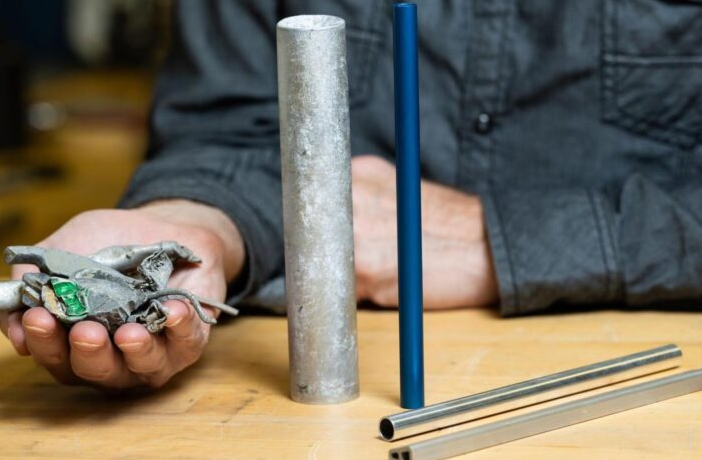

Eric Donsky's startup, Atomic13, has recently entered into an exclusive partnership with the U.S. Department of Energy's Pacific Northwest National Laboratory (PNNL). This agreement is centred on commercialising the innovative Shear Assisted Processing and Extrusion Process (ShAPE™) technology, which PNNL has patented. This groundbreaking technology can remarkably convert 100 per cent post-consumer scrap aluminium into top-tier extrusions of exceptional quality.

With this collaboration, Atomic13 aims to spearhead the production of a diverse array of custom profiles using the 6061 and 6063 alloys. These profiles are targeted for utilisation in the building and consumer products sectors, promising a sustainable and efficient approach to aluminium extrusion.
"The ShAPE technology is an amazing opportunity for U.S. manufacturing and the build-out of our critical infrastructure. We believe there is tremendous environmental and commercial value to building circularity in the aluminum extrusion industry while helping the building and construction industry significantly reduce the embodied carbon of their products," said Eric Donsky founder of Atomic13.
About the technology
The patented ShAPE technology developed by PNNL employs a rotating ram to extrude aluminium feedstock directly into high-quality extrusions. This innovative process involves a container holding the aluminium scrap pressed against an extrusion die by the rotating head.
The friction generated in this interaction heats and softens the material, making it malleable enough to be extruded through the rotating die.Unlike traditional methods, ShAPE does not necessitate preheating, external heating during extrusion, or the homogenisation of materials. As a result, this technology offers significant energy savings compared to conventional extrusion processes.
Moreover, the technology eliminates primary aluminium, which, depending on its source, can carry a substantial carbon footprint. Instead, this process facilitates the utilisation of 100 per cent aluminium scrap, including lower-grade variants such as Twitch. Twitch comprises a shredded post-consumer aluminium scrap mix with a maximum composition of 1 per cent iron, 1 per cent zinc, and 1 per cent magnesium. This capability further underscores the environmental benefits of the ShAPE technology, contributing to a more sustainable approach to aluminium extrusion.
"The ShAPE manufacturing process conserves energy and eliminates greenhouse gas emissions on several fronts. First, we avoid the need to add primary aluminum. Then, we eliminate the need for what is called homogenisation of the billet material, a 6- to 24-hour heat treatment near 500°C prior to extrusion," added said Scott Whalen chief scientist at PNNL, who led this research.
Aluminium extrusions – a cornerstone in the construction industry
Aluminium extrusions are a cornerstone in the construction industry, and the ShAPE process significantly expands the potential for using scrap in building applications. This is due to its deformation process, which generates high shear forces that effectively pulverise impurities within the scrap aluminium. These impurities are transformed into minuscule particles and evenly dispersed throughout the aluminium microstructure.
Through this dispersion process, the ShAPE technology eliminates issues such as microscopic iron clusters that can lead to micro fractures in recycled aluminium products manufactured using traditional methods. This breakthrough in aluminium extrusion ensures product integrity and offers substantial energy savings. Specifically, it removes the necessity to dilute impurities in recycled aluminium with 25–40 per cent newly mined aluminium before processing.
The PNNL team conducted thorough testing, evaluating the mechanical properties of various extrusions, including rods, tubes, and irregular hollow shapes with multiple channels, such as trapezoids. They tested 540 distinct product conditions, all manufactured from post-consumer scrap briquettes. Some of these briquettes contained elevated iron content ranging from 0.2 per cent to 0.34 per cent. Remarkably, every product met or exceeded the rigorous ASTM International standards for yield strength and ultimate tensile strength.
Atomic13 is advancing through the design phase of its inaugural commercial manufacturing line in partnership with a prominent equipment company in the extrusion industry. Simultaneously, the company assesses potential site locations in the Midwest and Southeast regions.
In line with its commitment to sustainability, Atomic13 is engaging in discussions with builders and construction firms that prioritise eco-friendly practices and the decarbonisation of building materials. These collaborations are aimed at integrating ShAPE aluminium extrusions into upcoming projects. The company is on track to begin accepting orders by early 2025, marking a significant step towards its vision of revolutionising the aluminium extrusion market with innovative, sustainable solutions.
“With approximately 55% of the global aluminum extrusion market servicing the building and construction industry, the evolution of ShAPE to include aluminum recycling for building structures is an enormous opportunity for decarbonizing the built environment. We are finding that the unique microstructures within the metal are more tolerant to impurities than previously thought. This enables us to reach even deeper into the aluminum scrap market while maintaining material performance,” added Whalen.



Responses






